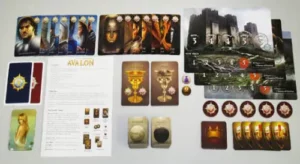For my competitive analysis I chose to play Avalon, made by Don Eskridge. Avalon is a collaborative social deception game where players are split into good and evil as they try to elect themselves and others whom they believe to be on their side to go on quests, where they can discreetly vote to have them either succeed or fail. The game is set in the times of King Arthur with each person being assigned an iconic member of Arthur’s roundtable or Mordred’s minions. This keeps with the theme of questing to immerse players in a fantastic world that makes it feel like their choices actually matter. Since only one non-bad guy, Merlin, knows who the bad guys are, the rest of the good players can only guess at who they can trust, using both what they know from people’s voting patterns and endorsements, as well as knowledge of their personalities, to guess at their true allegiances. Merlin himself can only speak in riddles as if they bad guys guess who he is at the end of the game, regardless of quest outcomes, then the good guys lose no matter what. Meanwhile, the bad guys must try their best to pose as good guys to get selected for quests. Even after being selected, they must still choose whether to have the quest fail, to advance their victory condition, or have the quest succeed so that they are trusted for future quests. This level of complexity is a brilliant dynamic brought about by a suite of mechanics that make players make deductions based on game knowledge, real-life personalities, as well as other people’s apparent trustworthiness. This game promises players lots of fun in the traditional sense, since it’s played with lots of players (usually between 5-10), and people laugh a lot when trying to collectively determine who’s “sus” and who’s not. It also promises players fellowship, challenge, and fantasy funs as players navigate the impossible task of either passing or failing three magical quests as everyone’s trust of everyone else devolves around them. This game is much more complex than other games in its genre due to its forced collaboration mechanics. In games like Spyfall and Coup, it’s everyone vs. everyone, so you can always assume everyone else is trying to make you lose. In Avalon, as a good guy, you must rely on others to get people from your alliance onto the quests, lest you be labeled a bad guy and never trusted again. As a bad guy, you must conspire with your fellow bad guys to deceive everyone else without getting caught. This kind of collective mischievousness provides a sense of elation I’ve truly never felt playing another game, as you bond with your fellow bad guys over the course of the game.




